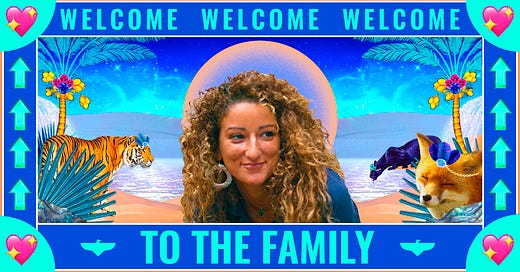The courage in choosing.
Hello Sunshine,
I hope you’re doing great. Last night, I asked on Instagram what topic I should cover in this newsletter. And among other spontaneous proposals from founders, there was this question:
How can I take on the responsibility of taking risks in my new company’s positioning?
Here, “taking risks” means “being radical”: choosing to fully embrace ONE (yes, only one) problem, situation, language and niche market—addressing a clearly identified group of people.
It’s not for the sake of being different, it’s in order to create a craze.
Why? Because you’re small. You don’t have money or time to lose trying to adapt to all types of clients. So you’re searching for that 1st group that will create a domino effect, going from one set of people to larger communities.
Once you feel like you found them, your goal is to turn these 1st clients into ambassadors, so they generate word-of-mouth when you’re not around. How? By actively listening to them, opening an on-going conversation while providing a solution they love more and more over time.
Ok. But the interesting bit in this question is not necessarily the business aspect of a niche, but instead the courage it takes to truly inhabit a niche.
To give you some context, I know the person who asked personally: she’s a first-time entrepreneur and the former head of customer service at a European unicorn. Since the pandemic started, she decided to take the leap, switching from being an employee in a B2B SaaS platform to creating her own startup.
And she left the obvious, accepted and “useful” world of B2B SaaS to jump into a more emotional and invisible one: mental wellbeing.
With that question she’s asking, I can also sense some doubts: “How can I take on the responsibility…” - meaning, how can I make the full-hearted decision to explore a field that is still largely unknown, whether in aspects legitimately owned by doctors or, on the contrary, parts filled with yahoos and gurus.
On that specific matter, I see things this way:
The explosion of yoga, meditation, astrology and self-development content and startups speaks for itself, and it keeps on expanding everyday.
Of course, as with anything that is rising, it can easily be seen by skeptics as ridiculous or grabbed by opportunists with unethical intentions.
But it reveals the continuous cry for a more meaningful life, which has dramatically expanded with the crisis.
Accepting the unknown as it is—unknown—is becoming less and less impossible, even given our rational societies.
There’s a place for non-dogmatic spirituality and tech is clearly facilitating its emergence.
So the question, “How can I take on the responsibility of taking risks in my new company’s positioning?”, comes down to taking your gut feeling seriously on a certain problem, and then diving into the places, communities, and conversations dealing with that issue. That’s it.
It won’t happen by listening to everybody’s opinion, however smart they may be. Entrepreneurs are researchers experimenting, not politicians decreeing; you’re not supposed to be right for everyone, you’re supposed to explore an untapped problem and provide a solution.
And by the way, I’d be much more reassured if entrepreneurs were providing all sorts of solutions for happiness, rather than the government (as some countries are actually doing).
Take care!




